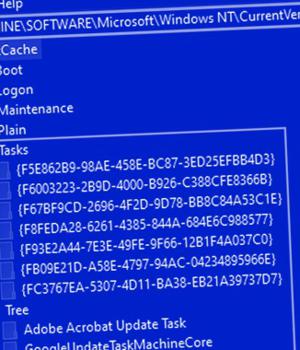Security News > 2022 > April > Microsoft Exposes Evasive Chinese Tarrask Malware Attacking Windows Computers

The Chinese-backed Hafnium hacking group has been linked to a piece of a new malware that's used to maintain persistence on compromised Windows environments.
Microsoft Threat Intelligence Center, which dubbed the defense evasion malware "Tarrask," characterized it as a tool that creates "Hidden" scheduled tasks on the system.
"Scheduled task abuse is a very common method of persistence and defense evasion - and an enticing one, at that," the researchers said.
Hafnium, while most notable for Exchange Server attacks, has since leveraged unpatched zero-day vulnerabilities as initial vectors to drop web shells and other malware, including Tarrask, which creates new registry keys within two paths Tree and Tasks upon the creation of new scheduled tasks -.
By erasing the SD value from the aforementioned Tree registry path, it effectively leads to the task hidden from the Windows Task Scheduler or the schtasks command-line utility, unless manually examined by navigating to the paths in the Registry Editor.
"The attacks signify how the threat actor Hafnium displays a unique understanding of the Windows subsystem and uses this expertise to mask activities on targeted endpoints to maintain persistence on affected systems and hide in plain sight," the researchers said.
News URL
https://thehackernews.com/2022/04/microsoft-exposes-evasive-chinese.html
Related news
- Microsoft: Windows CLFS zero-day exploited by ransomware gang (source)
- Microsoft fixes actively exploited Windows CLFS zero-day (CVE-2025-29824) (source)
- Microsoft fixes auth issues on Windows Server, Windows 11 24H2 (source)
- Fake Microsoft Office add-in tools push malware via SourceForge (source)
- Microsoft Patches 125 Flaws Including Actively Exploited Windows CLFS Vulnerability (source)
- WhatsApp vulnerability could be used to infect Windows users with malware (CVE-2025-30401) (source)
- Microsoft: April 2025 updates break Windows Hello on some PCs (source)
- Microsoft: Windows CLFS Vulnerability Could Lead to ‘Widespread Deployment and Detonation of Ransomware’ (source)
- Microsoft: Windows 'inetpub' folder created by security fix, don’t delete (source)
- Microsoft starts final Windows Recall testing before rollout (source)